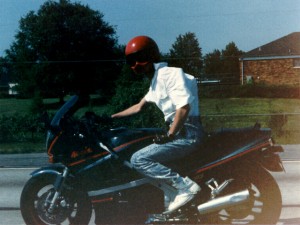Kawasaki Ninja 600RX
Wed, March 17th, 2010
Click image for larger view.
Scanned from the Tanshanomi archives. Sorry about the lousy quality.
| 1987 Kawasaki ZX600B Ninja RX | |
|---|---|
| Performance | |
| While there is nothing really wrong with the RX's performance, there is little exceptional about it, either. It used the same drivetrain as the garden-variety, steel-framed '86–'87 Ninja 600A. The fact that it was marketed as a limited edition racing model causes me to judge it more harshly than I otherwise would. | |
| Handling | |
| The RX's aluminum frame was cutting-edge at the time, but manufacturers had not yet optimized frame design to take full advantage of aluminum's unique properties. The lighter material reduced the weight of the bike by 16 pounds over the standard ZX600A, but the frame was otherwise nearly identical to the steel frame it replaced. One notable difference was that the side bars that wrapped around the engine were structural parts of the frame, not the screwed-on decorations present on the steel-framed 'A' model. The other difference was unrelated to the frame material: a steeper rake fit its intended role as a take-no-prisoners track weapon. | |
| Looks | |
| The black-and-gray graphics on the American version were remarkably subdued, and much more attractive than the regular 600 Ninja. The aluminum frame gave the visual language of the bike a genuine raison d'etre. | |
| Reliability | |
| Beyond the typical reduction for age, I worry about long-term fatigue issues with the rare, under-engineered frame. | |
| Practicality | |
| The steeper rake makes the RX twitchy and unsettled on the street. Since it was a one-year limited edition, many parts are scarce. | |
| Desirability | |
| It would be cool to have as a collectible museum piece, because it was one of the first aluminum-framed Japanese production bikes, and only 1000 were sold in the U.S. | |
| Overall | |
|---|---|
| It really was less of a big deal than Kawasaki's hype suggested. | |

